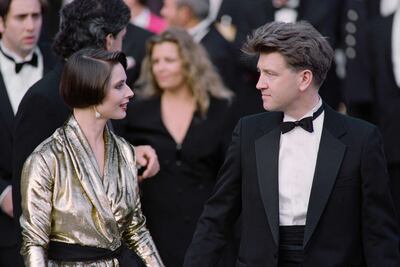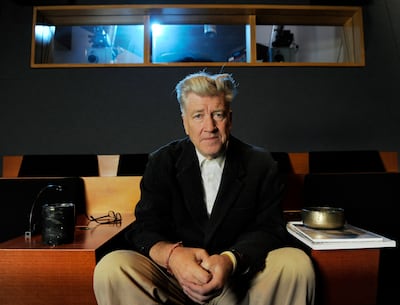In February 2017, I flew 16 hours from Dubai to Los Angeles to interview the great artist David Lynch. I have never been as nervously consumed by something before or since, save perhaps having to write about him in the hours after his death.
I’ve spent a good part of my life thinking about him, both his life and work – and how the two co-existed. When I can’t sleep, I put on his audiobooks. There was no one like him – a maze you’ll never find your way out of, especially if you foolishly try to solve it.
In the hours leading up to the interview, after a sleepless night, I was in full panic. What could I ask film’s most singular voice? Why had this opportunity fallen to me? Like a character in his film Lost Highway, in a fit, I tried to become him – dressing myself in his signature black suit and white shirt, and trying to master transcendental meditation on my hotel bed via a few YouTube videos to access a deeper part of myself I hoped might have all the answers.
Lynch, who died aged 78 on Thursday, was a master at finding that part of himself. He credited it to his own discovery of meditation in the 1970s, but in truth he was always attuned to his artistic voice. Part of it was his personality – deceptively simple-minded, bursting with enthusiasm for the simplest things in life, entranced by Americana even while deeply attuned to the darkness beneath it. With his art and being, he made the mundane seem ethereal. He was a powerful conduit to the human condition, both beautiful and terrible.

In trying to embody him that morning before our interview, I failed completely. The questions that I thought would open him up made no discernible dent. A few brilliant comments hung in the air between us, but I hesitate to take credit for having elicited them. Lynch is impenetrable in that regard – a door to which only he holds the key, and he’s not telling you where he hides it.
I’m not the only one who has tried to embody him over the years. His work – dark, metaphysical low fantasy, though rarely described as such – is unparalelled. And yet his influence is everywhere, especially when filmmakers try to capture the realm of dreams, as if he is the only true arbiter of the unwaking. Art is often described as Lynchian, but the precise definition of that has always remained a bit hazy. Oft imitated, never fully captured.
Ironically, because his aesthetics and storytelling voice are so unmistakable, he’s probably the easiest modern artist for AI to imitate – save perhaps Wes Anderson. Open ChatGPT and ask it to spit out ideas in the style of Lynch and you’ll get countless Twin Peaks facsimiles, perhaps with shades of Eraserhead or Mulholland Drive. Other apps can do the same for his visual sense and his sound design – which continued across his paintings, music and more.
But none of it will ever make a dent past the surface. Lynch can never be understood by an algorithm or left-brained thinking. He was a deeply intuitive artist. Read his interviews or his biographies and he’ll often say things to the effect of: “I don’t know why, I just did.” You get the sense that he wasn’t interested in answering questions even for himself – instead trusting that if they came from the right place within him, they spoke to a truth that was beyond description.

Buddhists call this “Buddha-nature”, the idea that true enlightenment has always been within us, it’s just a matter of accessing it. Regardless of whether you view this spiritually (Lynch personally connected with Hindu philosophy), there’s undoubtedly truth to it – the more we know ourselves, the better we can communicate with the world around us. Lynch was a master communicator, opening the minds of everyone who has engaged with his work – stirring up deep, sometimes distressing emotions that may take a lifetime to fully parse.
His work remains accessible and ageless because of its unmistakable humanity. With clarity of purpose, by connecting with his deep self and finding a way to bring it to the surface (which he called living "the art life"), he connected with us all – tapping into the field that unites us deep down, the ancestral soul in the subatomic.
That’s why, for artists, the best way to take influence from Lynch is not to try to know him better but to know thyself – the only wisdom he ever tried to preach to others. Real art is not in aesthetics, it’s in spirit. It’s embedded in humanity and cannot be soullessly generated, through AI or otherwise. Find the truth within you – though accept it may take longer than an anxious morning at the Chateau Marmont.
As Lynch told students at his alma mater the American Film Institute in a lecture late in life: “Tell the stories that are inside you. Each person has these stories that come along. Just stay true to those ideas and enjoy the doing of it.”
There will never be another David Lynch – nor should there be. But there are countless names that can rise to his heights if they follow the same path within.



